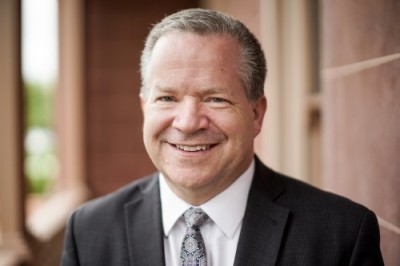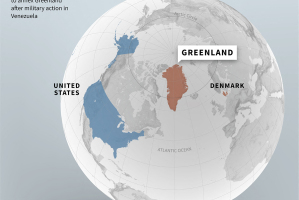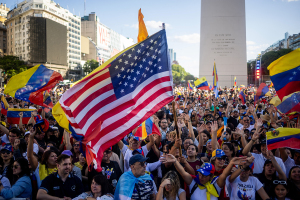From race relations to defunding the police, wedges don’t build bridges
If you want to bridge a divide, you cannot continue to drive the wedge of division deeper. You must remove the wedge.

Wedge issues have long been part of American politics. Over the past decade, wedges have been weaponized to a mind-boggling and deeply depressing level. Too many politicians, activist organizations, lobbyists, elected officials and influence-peddlers have decided they would rather drive lucrative wedges for fundraising than build bridges of understanding and improvement.
Raising money and winning elections on divisive wedges prevents good policy and real progress.
Divisive wedges are blocking the country from having real conversations about health care, immigration, education, poverty, addiction, national debt and mental health. Over the past few weeks, the wedges impacting race relations, prejudice, criminal justice, discrimination and law enforcement have been laid bare.
Pounding on these wedges only drives them deeper. Ignoring wedges allows them to burrow deeper where they will ultimately create devastating destruction and still deeper divides.
To the opportunists, wedges can represent a bonanza of media attention built from anger, angst and frustration. Combined with a boondoggle of money and a boatload of political leverage, wedges can become a winning formula — for the short-term.
The wedge of false choice
No serious politician can be truly serious about the “defund police” slogan. Or can they? It depends. If they are using the slogan as a wedge to win votes and fundraising cash, they will deepen and widen the divide and prevent meaningful dialogue. If, on the other hand, they are part of a growing group that believes law enforcement can be reimagined and recreated by dismantling and then developing a new model, they can help bridge the divide.
Chants of “No law enforcement!” or “Anarchy will reign!” or “All cops must go!” or “Who will you call to save you?” are all easy wedge mantras from across the divided spectrum.
Wedges are almost always presented as a false choice. Wedges, even on difficult issues, must be removed for improvement to take place.
The city of Camden, New Jersey, makes an interesting case study in removing the wedge. Budgets constraints and a deep-rooted adversarial and abusive culture had contributed to a police force that needed to be dismantled — and rebuilt. You could call that “defunding.” But the purpose was not a reaction; it was a choice to reimagine “community-oriented policing,” focused on partnerships and good old American community problem-solving.
Louis Cappelli, Camden County freeholder director, described the approach to Scottie Andrew on CNN.com. “It starts from an officer’s first day: When a new recruit joins the force, they’re required to knock on the doors of homes in the neighborhood they’re assigned to patrol,” Andrew reports. “They introduce themselves and ask neighbors what needs improving.
“Training emphasizes deescalation, and the department’s use of force policy makes clear that deadly force is the last option.”
The city has a ways to go, but removing as many divisive wedges as possible has enabled law enforcement and citizens to begin the bridge building so desperately needed in the community.
We are harboring many wedges in this nation — collectively, systemically and individually. Those wedges relating to race have been well chronicled. Decades of progress in attempting to remove them are marred with a litany of horrific failures and often faltering steps by individuals and institutions. The wedges of prejudice, discrimination, disdain and racism must be removed.
In addition, there are other individual wedges to deal with in our personal lives. Emotions such as contempt, hate, offense, shame, resentment and bitterness all must go.
Remove the hidden wedge
Many of us can recall the story by Samuel T. Whitman of a young boy who was supposed to return the wedge used to split logs to his father’s shed. The boy became distracted and placed the wedge between two limbs of a young walnut tree. After his play, he was called to dinner and forgot about the wedge completely.
The years went by. The tree grew and that wedge was soon unseen and undetectable, hiding under the surface.
Long years went by. The boy, then an older farmer, loved his prized walnut tree. One night in the midst of a blizzard and ice storm, to his surprise, the tree split and crashed to the ground.
In the morning as the farmer mourned the loss of his tree, he wondered how it was possible that such a strong and mighty tree had fallen so dramatically. As he inspected the fallen, shattered trunk and cracked branches, to his dismay, he saw the wedge he had placed there decades before as a boy.
The wedge had in a sense divided the tree, preventing the branches and trunk from forming a bond that would not break under the adversity and stress of storms, winds and weather. The wedge became a hidden weakness that ultimately destroyed the majestic tree.
Once the wedge had been put in place, no method of tweaking its position or painting over it, no pounding on it or ignoring it would stop the wedge from wreaking havoc on root, trunk and branch.
Wedges cannot be driven into bridges. The nature of a wedge is to continually, sometimes imperceptibly, drive deeper, causing the divide to widen. Bridges cannot be secure or stable if the divide is forever expanding.
The only remedy to a divisive wedge is to remove it.
Thomas Jefferson was a compelling and complex, inspired and flawed human, as all of us are. He was a slave owner and he also provided words and leadership that compelled Americans toward building bridges of unity, harmony and opportunity. His first inaugural address is instructive in our divisive and turmoil-ridden time.
President Jefferson won an election so nasty and contentious that many feared that the election was going to lead to riots, rebellion or even revolution. In a sign of humility and as a signal to national unity, Jefferson entered the Senate chamber of the Capitol dressed as an ordinary citizen. Washington and Adams had both worn ceremonial swords as they took office. Thomas Jefferson left the sword at home.
Jefferson said, “All, too, will bear in mind this sacred principle, that though the will of the majority is in all cases to prevail, that will to be rightful must be reasonable; that the minority possess their equal rights, which equal law must protect ... Let us, then, fellow-citizens, unite with one heart and one mind.”
It is impossible to unite in strength with a wedge in between. A heart cannot be truly united nor a nation of one mind if wedges remain. Jefferson eloquently declared to the people that “every difference of opinion is not a difference of principle.” We do not need to demonize those with differing opinions or question the patriotism of those whose approach to policy or progress is contrary to our own. Bridges beat wedges in the end.
At this moment, the persistent wedges found in our history and perpetuated in our society appear to have broken America. Perhaps the one redeeming quality of the wedges we are experiencing in our country is that these wedges won’t just break us. These wedges may just break us open. Broken open, we can remove the hidden wedges and begin to truly build bridges.
Boyd Matheson is the opinion editor at Deseret News and a former chief of staff for Senator Mike Lee. He is one of the nation’s political commentators with the best handle on the perspective of the middle of the country, while having the ability to uniquely speak to public policy and where politics intersects with religion.



























